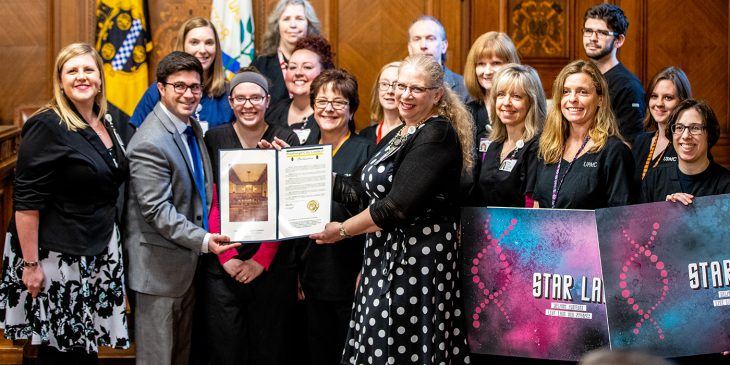This week marks the 43rd year of recognizing Medical Laboratory Professionals Week. The clinical laboratory professional conducts the scientific tests that provide vital laboratory results, without which doctors would lack the meaningful information needed to treat their patients efficiently and effectively.
On Tuesday, Pittsburgh City Councilman Corey O’Connor read a proclamation commemorating this week as “Medical Laboratory Professionals Week” in Pittsburgh. A group of UPMC lab personnel attended the reading, and participated in a photo opportunity with O’Connor.
Since its origination in the 1920s, this profession has grown in size and importance. Today, more than 300,000 individuals are employed as medical technologists and technicians in the United States and the profession is anticipated to grow 13 percent over the next 10 years.
Clinical laboratory personnel may have little to no direct patient contact. Instead, the focus is on utilizing technical skills required for reporting reliable test results that are of vital importance to the rest of the health care management team and the patient. These workers do much more than just operate the various new and emerging technologies that make diagnostics more efficient; the many specialized subdivisions of this profession are comprised of trained and talented individuals who are helping to shape the fields as they continue to grow.
The term “Medical Laboratory Professional” is a generic label for those dedicated to working in any of the many disciplines within the field of Clinical Laboratory Science — medical technicians, medical technologists, clinical pathologists and others. These jobs require varied degrees and certifications. Many colleges offer associate degrees for medical technicians, while others partner with certificate programs for medical technologists who are completing baccalaureate degrees. Advanced degrees are available in many fields of study, as are specialist certifications by accrediting organizations. Medical professionals are employed in hospitals, research facilities, physician offices and reference laboratories.
Educational programs are an important part of National Laboratory Professionals Week, such as those that encourage students to enter the laboratory field as a career. Many annual festivities and events are organized to increase public awareness, including The American Society for Clinical Laboratory Science’s Lab Week Run, which is a virtual 5K in which anyone can participate. Curious to know more about lab week? Check out the hashtags #LabWeek and #Lab4Life on your favorite social media outlet and browse the results.
This year’s lab week celebration theme is Star Lab. In the UPMC Clinical Laboratory Building, staff will participate in various contests and activities throughout the week, enjoy a lunch, and on Friday will be able to dress-down and wear a science fiction-themed T-shirt, such as “Star Trek” or “Star Wars” under their scrubs.
Mollie Wilson and Alice Kruse are medical technologists at UPMC.









